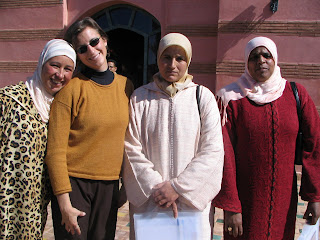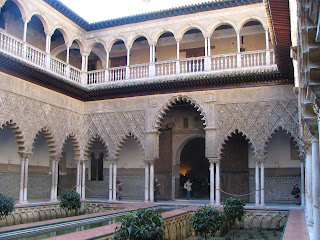I am back in the US, and for all the talk from Peace Corps about “reverse culture shock,” etc. etc., I somehow thought I’d be immune. Hey, I’ve come back from months in developing countries before, and even visited home a couple of times during Peace Corps. Of course I knew that things like shopping (especially this time of year!) would be awful – stuff stuff stuff (now, I like my stuff as much as the next person, and am certainly grateful to have access to some of it again, but really, how much of this does anyone actually need!? And I can't even identify what some of these things are!). I am happy to be with my family again, but otherwise (still unemployed and apparently will be for the foreseeable future) within a week I was going stir crazy. Enough student loans to pay for a small HOUSE aren’t good for my psychological state either…
How can I be so tired of traveling and yet want to do something already?
I visited Beirut for a week on my way home from Morocco. Honestly, hitting a few nice(er) restaurants, shops (not that I had money to spend), an amazing museum, and even a jazz club made for quite a nice culture fix. I was flattered when people in the street spoke in Arabic to me (and shocked to understand a word or two since it is a very different language from anything I picked up in Morocco), but French and English were everywhere. Yes, there was a strong military presence – soldiers everywhere and a tank every couple of blocks – and plenty of remaining bombed out buildings not too far from quite a bit of redevelopment, but (and perhaps this was the neighborhood where I was staying – near the American University of Beirut and the Hamra shopping district) I often felt like I might as well have be
 en in New York! After seeing King Mohammed VI’s portrait all over Morocco (to the right, in Al Hoceima), looming billboards of Rafik Hariri (Lebanon’s Prime Minister who was assassinated in 2005) seemed perhaps morbid to me, but not otherwise unusual. A friend showed me the site of the blast that killed Hariri – a large hotel on the Mediterranean coast – which remained a shell of a building. Politically, Lebanon remains unstable – enough so that some of my Moroccan friends asked me to reconsider my travel plans. I had hoped that a new President would be elected during my visit, but the December 7 deadline came and went. I left two days before the assassination of General Francois al-Hajj.
en in New York! After seeing King Mohammed VI’s portrait all over Morocco (to the right, in Al Hoceima), looming billboards of Rafik Hariri (Lebanon’s Prime Minister who was assassinated in 2005) seemed perhaps morbid to me, but not otherwise unusual. A friend showed me the site of the blast that killed Hariri – a large hotel on the Mediterranean coast – which remained a shell of a building. Politically, Lebanon remains unstable – enough so that some of my Moroccan friends asked me to reconsider my travel plans. I had hoped that a new President would be elected during my visit, but the December 7 deadline came and went. I left two days before the assassination of General Francois al-Hajj.
That said, I wish I had stayed longer, and seen a bit more. Due to an unfortunate bit of miscommunication with my would-be host, I didn’t plug into my own agenda until later in the week, thus missing the ruins of Baalbek, which I had very much wanted to see. Other out-of-town sights weren’t necessarily at their safest, but I still made several nice day trips. One afternoon I visited the stunning Jeita Grotto (sadly, no photos allowed), where my claustrophobia was not at all an issue. Even though it seems set up for tourist traffic to the point of potentially being a bit cheesy, it was nearly empty during my visit, and admittedly one of the more beautiful natural spots I’ve seen in my life.
I spent a day in the town of Byblos, with several hours trying to figure out all of the archeological layers and history in its seaside ruins. Indeed, there, Beirut, and even looking at the artifacts in the National and university museums, I simply had a hard time wrapping my head around the millennia of history literally at my feet.
Apart from a couple of other short trips north of the city, and viewing part of the legendary cedar forest, I also traveled into the Chouf Mountains – traditionally a Druze stronghold. There, I visited the Ottoman’s Beiteddine Palace (built by Italian architects in an Arabic style...):

I have to say that, on the whole, one of the best parts of this trip has been my opportunity to learn a bit more than my spotty BBC signal and out-of-date Newsweeks (not my publication of choice, but it’s what I got my hands on most regularly in Morocco, courtesy of Peace Corps) had previously afforded me. I’m hardly an expert on the Middle East, and found the unique religious and cultural complexities of this country to be especially compelling.















 Mina shows me how it's really done.
Mina shows me how it's really done.









.JPG)
 Rabha (Imilchil’s cooperative president, whom I seem to run into nearly everywhere I go), me, Aicha, and Mina, at the fanciest hotel in Errachidia.
Rabha (Imilchil’s cooperative president, whom I seem to run into nearly everywhere I go), me, Aicha, and Mina, at the fanciest hotel in Errachidia.

















